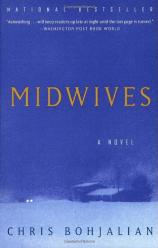Reading Group Guide
Discussion Questions
Midwives

1. By the time Sibyl was of college age, her daughter says, "She had already developed what was then a popular distaste for most traditional or institutional authority" [p. 31]. How does Sibyl continue to maintain an "anti-establishment" stance throughout her life? How does the legacy of the sixties continue to shape the lives, and the self-images, of Sibyl, Rand, and Stephen?
2. "My mother never came quickly or lightly to the decision that one of her patients should go to a hospital" [p. 62]. Why not? What does the act of home birth symbolize for Sibyl, her patients, and the other midwives?
3. Does Anne Austin do the right thing by calling Dr. Hewitt, or does she act out of hostility towards Sibyl? Why doesn't she call Sibyl before talking to the doctor? Should she have done so?
4. Sibyl notes that bankers, lawyers, doctors, and architects choose to have babies at the hospital rather than at home. What point is she trying to make?
5. Tom compares doctors with "pack animals" [p. 95]. Stephen, at the trial, says, "The whole idea that a midwife can do what they do--and do it better--drives some of them crazy, and so they're persecuting my client" [p. 232]. Are these accusations fair, or unfair, to doctors?
6. After Charlotte's death, Tom says to Connie, "So, they're going to have to blame someone" [p. 101]. Do you think this is true? Is Sibyl blamed because people must blame someone? Should someone be held accountable for every death of this sort, or can some be simply attributed to tragic accident?
7. Sibyl carries Pitocin and Ergotrate in case of emergencies during labor. For a lay practitioner to do so is illegal, "but," as Connie states, "every midwife carried them. My mother wasn't unique" [p. 64]. How does this affect midwifery's position as a natural way of delivery? Does the fact that every midwife does so make it all right, or should use of these drugs be limited, as the law prescribes, to licensed doctors and nurses?
8. How alike, basically, are Rand and Sibyl? Has Rand changed more or less than Sibyl from their hippie days? How compatible is he with Sibyl and what she stands for? Do you see their marriage as essentially happy?
9. Do you think that the relationship that develops between Sibyl and Stephen is simply a flirtation, or is it more than a flirtation? What role do Rand's behavior and attitude during the trial play in fostering this relationship?
10. Some of the male and female reporters who cover Sibyl's trial try to avert their eyes from the breasts of the many nursing mothers in the courtroom [p. 213]. Does this reflect to you an essential discomfort with the human body in our culture? Might such a discomfort explain society's disapproval of people like Sibyl Danforth?
11. In the final analysis, do you think that Sibyl behaves irresponsibly during Veil Bedford's birth? Should she, as the prosecution claims, have been more alert to potential weather problems and to Charlotte's health history? Is she precipitate in performing the cesarean section without checking Charlotte's life signs a final time after Asa and Anne returned with the knife, or is it imperative that she rush in order to save the child's life?
12. Do you believe that Connie makes the right choice in shielding her mother from the law? "My mother's conviction would not bring back Charlotte Bedford. It would merely destroy a second woman," Connie reflects [p. 295]. What about the principle involved? Should Sibyl in fact have been allowed to continue to practice as a midwife?
13. "My choice of profession was neither an indictment of my mother's profession nor a slap at her persecutors," says Connie [p. 143]. Is this true? What does Connie mean when she says that "atonement," "reparation," "compensation," and "justice" entered into her decision to become an obstetrician [p. 303]?
14. Did Sibyl's final diary entry [pp. 309310] change any of the opinions you formed during the course of reading about the trial? If you had any firm ideas about home versus hospital birth, have they been changed by reading this book? Do you think that lay midwives should be allowed to practice? Would you trust yourself to the care of a midwife, or would you go to a hospital for delivery by a doctor?
15. Connie quotes physicians as saying: "But we've lost our collective memory of the fact that although labor is natural, it's dangerous. Let's face it, there was a time when women and babies died all the time in labor. . . . A hospital is like an infant car seat: If something unexpected should occur and there's some kind of collision, we have the tools to pull the baby out of the oven" [p. 18]. The midwives argue: "What's the price of attempting to eliminate chance, or trying to better the odds? A sterile little world with bright hospital lights?" [p. 123]. By which of the two points of view do you find yourself persuaded?
Midwives
- Publication Date: November 8, 1998
- Genres: Fiction
- Paperback: 374 pages
- Publisher: Vintage
- ISBN-10: 0375706771
- ISBN-13: 9780375706776








